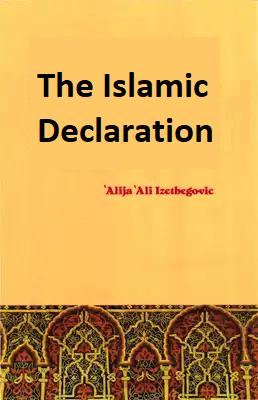صدر حديثًا
هذا الكتاب جديد وسيتم رفعه فور توفره لدينا وبعد الحصول على حقوق النشر اللازمة.

كتاب The Islamic Declaration PDF
(0)
المؤلف:
علي عزت بيجوفيتشعدد القراءات:
224
اللغة:
الإنجليزية
الفئة:
الأديانالقسم:
الصفحات:
41
الجودة:
ممتاز
المشاهدات:
1572
اقتباس
مراجعة
حفظ
مشاركة
وصف الكتاب
The Islamic declaration: A programme for the islamization of Muslims and the Muslim peoples
The Islamic Declaration is the name of the book published by Alija Izetbegović in 1970. In 1969, Alija Izetbegović drafted the text of the Islamic Declaration, which he completed and published in 1970. After the "Sarajevo Trial" in 1983, the case gained interest, and Izetbegović was sentenced for the second time for the so-called Islamic fundamentalism. Although written in Yugoslavia, that is, in Bosnia and Herzegovina, the Declaration did not focus on the local political conditions, but on the so-called the Islamic world, which is treated in the book as a coherent spiritual, political and administrative space.
The content of the book is divided into three parts. The first part "The Backwardness of Muslim Nations" describes the ideas of Islamic renewal between conservatives and modernists, the causes of the impotence and indifference of the Muslim masses. In the second part of the book, Alija Izetbegović describes religion and law, referring to the definition of what the Islamic order essentially means. Also, Izetbegović notes in the second part that Islam is not only a religion, but also an internal and external, moral and social, spiritual and physical part of life, referring to verse 77 of Surah El-Kasas. In the part of the book "Islamic Order", Alija Izetbegović talks about the Islamic order of our time, man in the community, human equality, brotherhood and unity of Muslims, zakat and interest, republican principles, Allah as the only deity, upbringing, education, freedom of conscience, Islamic independence, work and struggle, women and family, minorities and relations with other communities. In the third part of the book, Alija Izetbegović describes the problems of the Islamic order today based on the Islamic revival as a religious or political revolution. Also, in this part, Alija Izetbegović describes the Islamic government, citing examples primarily of Pakistan, but also of other Muslim countries, and at the same time points out:
In the Muslim world, there is no patriotism without Islam.
As for Christianity, Alija Izetbegović welcomes the new tendencies declared by the last Vatican Council and evaluates them as a certain approach to the original foundations of Christianity. Alija Izetbegović also emphasizes that the Islamic attitude towards Judaism is based on the same principle as the attitude towards Christianity, where Islamic and Jewish culture are interwoven with similar, or even the same historical values. Finally, Alija Izetbegović talks about capitalism and socialism in the world.
علي عزت بيجوفيتش
علي عزت بيغوفيتش (8 أغسطس 1925 - 19 أكتوبر 2003) سياسي بوسني ومحامي وفيلسوف إسلامي ومؤلف ، أصبح في عام 1992 أول رئيس لرئاسة جمهورية البوسنة والهرسك المستقلة حديثًا. خدم في هذا المنصب حتى عام 1996 ، عندما أصبح عضوًا في رئاسة البوسنة والهرسك ، وخدم حتى عام 2000.
كان مؤسس حزب العمل الديمقراطي وأول رئيس له. كان عزت بيغوفيتش أيضًا مؤلفًا لعدة كتب ، أبرزها الإسلام بين الشرق والغرب والإعلان الإسلامي.
الكتاب غير متاح حاليًا
هذا الكتاب غير متاح حاليًا للنشر. لقد حصلنا عليه من بموجب ترخيص المشاع الإبداعي، ولكن المؤلف أو دار النشر لم يمنحا الإذن بنشره.
قيم الآن
5 نجوم
4 نجوم
3 نجوم
2 نجوم
1 نجوم
اقتباسات The Islamic Declaration
الأعلى تقييماً
الأحدث
اقتباس
كن أول من يترك اقتباسًا واكسب 10 نقاط
بدلاً من 3
التعليقات
كن أول من يترك تعليقًا واكسب 5 نقاط
بدلاً من 3